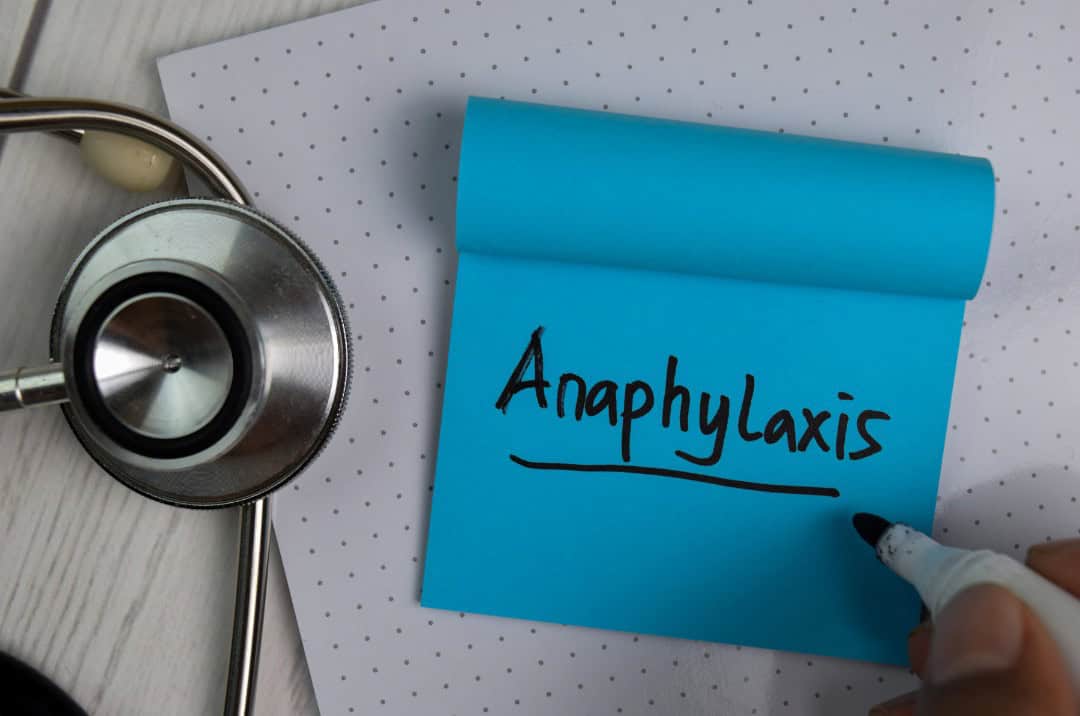1st – 7th October 2024
This annual event was established to raise awareness of severe allergies and anaphylactic reactions. The purpose of raising awareness is to educate people of the appropriate ways to respond to someone having an anaphylaxis reaction and the importance of acting quickly.
What is anaphylaxis?
Anaphylaxis is defined as a serious and often sudden allergic reaction that affects the whole of your body. The reaction can occur within minutes of being exposed to the allergen, or up to 2-3 hours later. Because it affects your whole body, an anaphylaxis reaction can be life threatening and requires an immediate emergency response.
What causes an allergic reaction?
An allergic reaction is caused by a sudden release of chemicals from cells in the body. This release is triggered by a reaction between the immune system’s antibodies and the allergen.
An allergy develops when someone is previously exposed to an allergen and the body mistakenly identifies it as a threat. After being identified as a threat, the immune system begins to make antibodies to fight the allergen. When the body encounters the allergen again, the immune system starts a chain reaction which causes chemicals such as histamine to be released and these chemicals are what cause the allergy reactions.
Symptoms
Anaphylaxis is an allergic reaction that affects a person’s blood pressure, heart and breathing; therefore, it is important to look out for the three most common symptoms:
- Airways
Swelling in the throat, tongue or upper airways, causing a tight throat, hoarse voice and difficulty swallowing.
- Breathing
Sudden onset wheezing, breathing difficulty or noisy breathing.
- Circulation
Dizziness, feeling faint, sudden sleepiness, confusion, pale, clammy skin and loss of consciousness.
Additional symptoms include:
- Red raised rash (hives) anywhere on the body
- Tingling sensation or itchy mouth
- Stomach pain
- Vomiting
- Swelling on the lips, face or eyes
Who’s more likely to experience anaphylaxis?
Anyone can experience anaphylaxis, however there are factors that make you more at risk, these include:
- Poorly controlled asthma
- Suffering from an infection or have recently recovered from an infection
- Exercising before or after contact with an allergen
- Suffering from hay fever
- Drinking alcohol
- Recently taken a NSAID (non-steroid anti-inflammatory drug) for example aspirin or ibuprofen
Treatments for anaphylaxis
If someone knows they have anaphylaxis they should have been prescribed an AAI. Often referred to as an EpiPen or Jext, an AAI is a pre-loaded auto-injectors containing adrenaline. It is recommended that you should always carry two AAIs on you (make sure that they are in date and are the correct dose).
In an emergency
If you are experiencing the symptoms of an anaphylaxis reaction you should complete the following steps:
Lie flat on your back with your legs raised. Once lying flat, your blood flows back to your heart and other vital organs. If this causes you difficulty breathing, you may be propped up but only for a minimal time period. While lying flat, avoid changing your posture and use your AAI (injected into the muscle on your outer thigh). Your AAI may be used through clothes if necessary, however the directions are different depending on the brand.
Call 999. Even though you have used your AAI, you should still call for an ambulance. If you are unable to, make sure someone else calls for you. When asking for an ambulance, state that this is a case of anaphylaxis.
Make note of when you used your AAI. If you do not feel better or feel worse after 5 minutes, you may inject your second AAI. Whilst waiting for the ambulance remain lying down, even if you are feeling better.
Information taken from:








